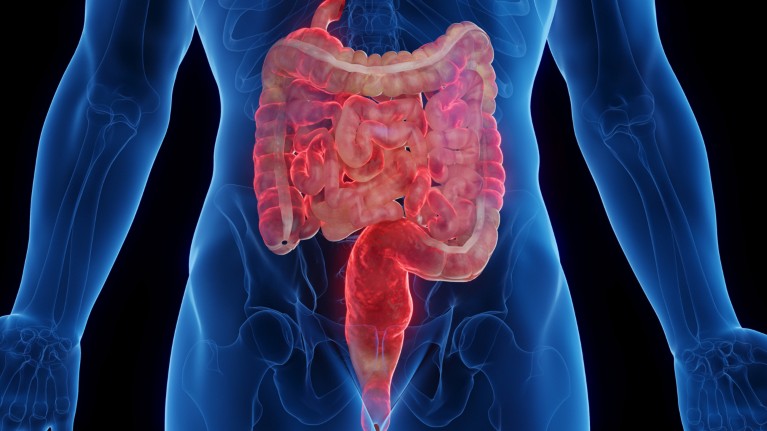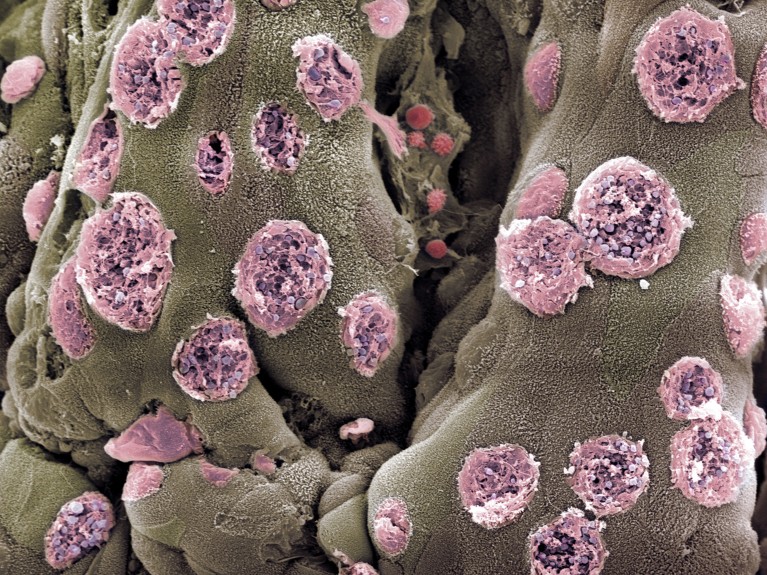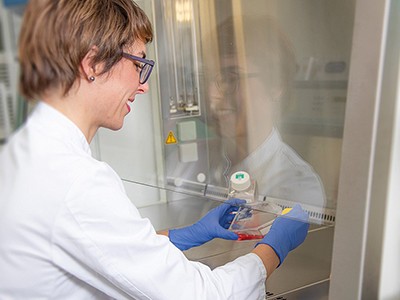
Crohn’s illness, a type of inflammatory bowel illness, usually impacts the intestines (artist’s illustration).Credit score: Sebastian Kaulitzki/Science Picture Library
When geneticist James Lee and his colleagues printed a paper in June linking a gene to inflammatory bowel illness (IBD), he didn’t count on the general public to take a lot discover. Issues didn’t go as deliberate.
“I acquired inundated,” he says.
By the tip, Lee did greater than 25 interviews for radio and print shops around the globe and acquired tons of of e-mails from folks with IBD. “It’s a testomony to how frequent inflammatory bowel illness is,” says Lee, who works on the Francis Crick Institute in London. “And likewise a testomony to how determined persons are for higher therapies.”
Lee’s paper, printed in Nature1, is one among a number of latest stories providing hope that individuals with IBD may at some point have higher therapy choices tailor-made to their illness. Lee and his colleagues discovered that adjustments within the exercise of a gene that’s essential within the immune system may contribute to some instances of the illness. One other examine discovered that some folks with IBD make antibodies that disable a pivotal anti-inflammatory protein2 and a 3rd examine tracked how populations of intestine micro organism adapt to an infected atmosphere3.
The papers have a look at IBD from totally different angles, however collectively supply a glimpse into the ways in which physicians would possibly at some point be capable of higher match folks with IBD to acceptable therapies, says David Artis, an immunologist at Weill Cornell Medication in New York Metropolis. “Not each inflammatory bowel illness affected person who walks within the door is similar,” he says. “If we are able to map that distinction to some extent, I believe we’re going to have the ability to higher deal with these folks.”
Life-altering illnesses
IBD is a painful situation that causes persistent irritation of the digestive tract. Two of the most typical types of IBD are ulcerative colitis and Crohn’s illness. Each could cause diarrhoea, anaemia and belly cramping.
Like many autoimmune problems, IBD has an aetiology that’s murky and complicated, with contributions from each genetics and the atmosphere. What is evident is that incidence of the illness is rising in lots of areas of the world4.
Over the previous decade, researchers have amassed a prolonged record of genetic variations which are linked to IBD. However Lee and his colleagues determined to look at a area of the genome the place few geneticists had bothered to look: a “gene desert”, says Lee, so named as a result of it’s devoid of any recognizable genes. “We didn’t know what we have been going to search out,” he says. “And we ended up discovering a grasp regulator of inflammatory responses.”

Mucus-producing cells (pink; artificially colored) stud the intestines of an individual with ulcerative colitis, a typical type of inflammatory bowel illness.Credit score: Steve Gschmeissner/Science Picture Library
This grasp regulator is a stretch of DNA that controls the exercise of a gene known as ETS2, which is situated distant from the gene desert. Excessive ranges of ETS2 exercise, the staff discovered, increase the flexibility of immune cells known as macrophages to promote irritation.
The discovering additionally indicated {that a} class of most cancers medication known as MEK inhibitors would possibly stop the activation of ETS2. The staff discovered that these medication may block the results of the ETS2 protein, together with the discharge of inflammation-promoting molecules, in cells grown within the laboratory. However MEK inhibitors can turn into poisonous to different cells if given over the long run, says Lee, and so the staff is growing methods to ship the inhibitors solely to macrophages earlier than testing the strategy in folks with IBD.
Rogue antibodies
One other examine has discovered a choose group of individuals with IBD who may need a brand new therapeutic possibility within the close to future. Paediatric immunologist Sophie Hambleton at Newcastle College in Newcastle upon Tyne, UK, and her colleagues analysed samples from two kids with IBD. The scientists found that the kids have been producing antibodies that block the exercise of a protein known as IL-102. This protein has anti-inflammatory results within the intestine.
However the kids’s antibodies meant that IL-10 was unable to dampen irritation of their intestines, resulting in IBD, the researchers reported in July within the New England Journal of Medication. As soon as the hyperlink between IL-10 and their illness was recognized, one of many kids was handled with therapies to deplete the antibodies, easing their signs.
It’s unclear how many individuals with IBD make antibodies towards their very own IL-10, says Hambleton. However when the staff checked out a pattern of adults with IBD, they discovered “a transparent minority” who additionally produced the antibodies. “We’re very assured that that is going to be a contributory mechanism in additional sufferers,” she says.
Microbiome response
Along with genetics and immune cells, microorganisms are thought to play an element in IBD. Within the third examine, Christopher Smillie, who research the human microbiome at Harvard Medical College in Boston, Massachusetts, and his colleagues, checked out how persistent irritation shapes evolution of the microorganisms dwelling within the digestive monitor3.
Intestine feeling yields proof of microbial involvement in autoimmunity
They recognized 140,000 bacterial strains in stool samples from folks with and with out IBD. A whole lot of those strains have been related to IBD, and plenty of seem to have tailored to dwelling in infected tissue. Amongst these, a number of could possibly be used to foretell illness severity: for instance, the abundance of some strains of Eggerthella lenta declined as the degrees of a protein related to irritation rose. The outcomes have been printed in Cell Host & Microbe in July.
In the end, Smillie hopes that characterization of those microorganisms will result in methods to watch illness development, and to kind folks with IBD into teams on the idea of how probably they’re to reply to potential therapies.
Every of those research may contribute to that aim, however the work continues to be preliminary, says Gabriel Nuñez, an immunologist on the College of Michigan Medical College in Ann Arbor. For instance, the microbial examine doesn’t present that any of those organisms contribute to illness, he notes. And it’s unclear what quantity of individuals with IBD have altered ETS2 exercise or make autoantibodies towards IL-10. “Maybe these are uncommon sufferers, and solely a handful on the earth will profit,” he says.
However, if solely a handful of individuals discover reduction due to these outcomes, that will probably be progress, he provides. “Even for those who treatment just one affected person, it’s essential for that particular person and their household.”



